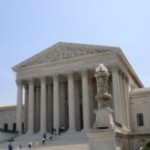Supreme Court Clarifies Standard Of Proof For Indirect Patent Infringement
 Los Angeles – The Supreme Court recently clarified the standard of proof required to prevail in an action for indirect patent infringement by intending to induce infringement in a recent case, Global-Tech Appliances v. SEB S.A., 131 S. Ct. 2060 (2011). Prior to the ruling, it was unclear whether the inducing party must have acted only to induce the infringing act or whether the inducing party must have also intended that the infringing act actually infringe the patent at issue. The Supreme Court recently held that to be liable for inducing patent infringement under 35 U.S.C. § 271(b), the defendant must have knowledge that the infringing act it induced constituted patent infringement.
Los Angeles – The Supreme Court recently clarified the standard of proof required to prevail in an action for indirect patent infringement by intending to induce infringement in a recent case, Global-Tech Appliances v. SEB S.A., 131 S. Ct. 2060 (2011). Prior to the ruling, it was unclear whether the inducing party must have acted only to induce the infringing act or whether the inducing party must have also intended that the infringing act actually infringe the patent at issue. The Supreme Court recently held that to be liable for inducing patent infringement under 35 U.S.C. § 271(b), the defendant must have knowledge that the infringing act it induced constituted patent infringement.
The case arose when Respondent SEB invented a deep fryer, obtained a patent for the invention, and began marketing the fryer. Sunbeam Products then requested that Pentalpha, a Hong Kong based subsidiary of Petitioner Global-Tech Appliances, supply Sunbeam with a deep fryer meeting specifications set forth by Sunbeam. Pentalpha then obtained a SEB fryer and provided Sunbeam with deep fryers based on that SEB model, changing only aesthetic features of the SEB fryer.
SEB sued Sunbeam for patent infringement and subsequently brought an action against Pentalpha’s parent company Global-Tech for intentionally inducing Sunbeam’s patent infringement under 35 U.S.C. § 271(b). The jury found that Global-Tech’s subsidiary had indeed induced patent infringement and the court entered judgment for SEB which was affirmed by the Federal Circuit.
Unlike actual patent infringement which does not require intent to infringe, inducing patent infringement under § 271(b) requires that the defendant act with intent to induce infringement. The standard applied by the federal circuit and upheld by the Supreme Court in this case requires that the defendant knew or should have known that its actions would induce actual patent infringement.
In this case, the Supreme Court found that the evidence was sufficient to find knowledge on Pentalpha’s behalf under the theory of willful blindness. Though “deliberate indifference” to the existence of a patent would not satisfy the knowledge requirement, willful blindness to the existence of a patent is akin to knowledge.













